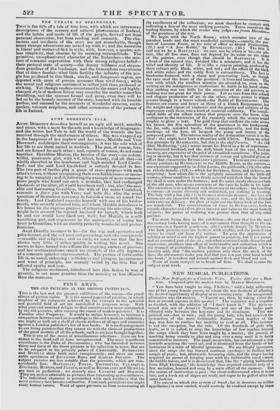AUNT DOROTHY'S TALE.
AUNT DOROTHY describes herself as an ugly old maid, sensible and pious, with a taste for the arts and a knowledge of languages ; and she writes her Tale to tell the world of' the wounds she has received through the misfortunes of others. She was wrapped up in the happiness of her nephew and her niece, Matilda and Yore Harcourt ; and,despite their consanguinity, it was the sole wish of her life to see them united in wedlock. The pair, of course, love, and are formed for each other ; and, equally of course, do not come together. Geraldine Morton, the heroine of the story—an ardent, wilful, passionate girl, with wit, talent, beauty, and all that—is wholly absorbed in the handsome and high-minded Lord Castle- ford ; and the said Lord Castleford is entirely devoted to her. The two pair of turtles play a game of cross-purposes with each other's lovers, without recognizing their own faithlessness or mean- ing to be naughty ; and if, following the example of more common- place people who found out such a mistake, they had exchanged husbands at the altar, all would have been well : but, alas ! the ami- able and fascinating Geraldine, the wife of the noble Castleford, commits a faux pas with Vero; and both die, after the usual quantum of distraction necessary to furnish a scene all round the family. Lord Castleford consoles himself with one of his brides- maids, who secretly admired him, and whom Matilda introduces to his house for the express purpose of attracting his attention. She might have secured the injured husband for herself, which both be and she would have liked very well ; but Matilda is a self- sacrificing girl, and acquiesces in the anticipation of losing her lover to Geraldine, with an alacrity perfectly wonderful and preter- feminine.
Aunt Dorothy assumes to be—for the wig and spectacles and poke-bonnet, and the red nose and green bag, look like masquerade —sensible and religious ; and as such, we must say that she has shown very little cf either quality in writing this novel. She seems to have Panned into a flame the expiring embers of passion ; and her sentitnentalisms smack too strongly of the silly raptures of a romantic spinster superannuated. The picture of hishionable life is, as usual, sickening : selfishness and intrigue, impertinence and want of principle, are scarcely veiled by the thin film of affected apathy and ease.
The religious sentiment, introduced into this fiction by way of garnish, is not more genuine than the morality or less offensive than the manners.


























 Previous page
Previous page